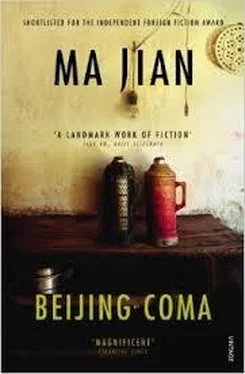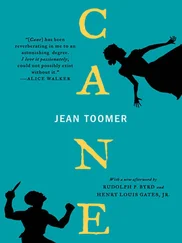‘Where’s Wang Fei?’ Bai Ling asked anxiously. Her skin was sallow and her eyes were red. Having seen the blood-soaked cloth around Xiao Li’s head, she was probably afraid that Wang Fei might get injured too.
‘Don’t worry,’ I said. ‘Chen Di’s gone to fetch him.’
‘Send some students to the intersections to remind the citizens not to use violence,’ Hai Feng said. ‘If the soldiers are attacked, they’ll treat us all as the enemy, and none of us will come out of this alive.’
Lin Lu glanced at him angrily and said, ‘Everyone’s pretty disgusted that Shu Tong ran away to America. I think you Beijing University students should keep quiet from now on.’
‘Stop bickering!’ Bai Ling said. ‘This is the time to show what we’re made of!’ Perhaps because she spoke so softly and was the only girl in the tent, we all deferred to her.
‘Everything here will be razed to the ground,’ Zhuzi said, walking up. A continual crackle of commands and reports was coming over the walkie-talkie fixed to his waist.
‘My intelligence unit has drawn up a diagram of the situation,’ Lin Lu said, pulling out the annotated map. ‘Look, we’re done for. The 27th Army is moving in from the west, with a unit that’s been given specific orders to arrest the student leaders. I’ve just heard on the walkie-talkie that a secret unit is now guarding the intersections on all the roads leading back to the university district. The soldiers have photographs of each one of us. If we tried to return to the campuses now, they’d seize us and put us in jail. It would be better to let them come into the Square and arrest us in full view of the public.’
‘Shao Jian, get your policy implementation unit to tell everyone to leave their tents and gather round the Monument,’ Bai Ling said. ‘Everyone must stay awake tonight and wait for further orders.’
‘There are 200,000 troops heading our way, but there are only 10,000 of us left in the Square,’ Liu Gang said, his face deathly pale. ‘The citizens are still managing to hold the army back, but they won’t be able to do so for much longer.’
I removed my sunglasses then quickly put them back on again. Although everything looked darker through the lenses, they blocked out some of the frenetic dread in the atmosphere.
The sky darkened suddenly and a heavy rain began to fall, accompanied by strong gusts of wind. I thought of Tian Yi, who’d gone to telephone various professors to invite them to the Democracy University’s opening ceremony, and of my brother, who was helping her out, cycling through the back lanes to press bureaus across the city to remind the journalists to come. Tian Yi was determined that, whatever happened, the Democracy University’s opening ceremony would still go ahead that night.
Only the living have the right to die. You must climb back onto their riverbank before you can throw yourself into the water again.
This 1950s red-brick apartment building has thick, sturdy walls, as do the buildings that surround it on either side. At dawn, the compound is as quiet as the graveyard in my ancestral village. Whenever I think of that place, I smell the earthworms squashed on the stone path.
The migrant labourer who’s renting the flat below has stopped shouting and swearing. A few days ago, the police dragged his wife away because she wasn’t able to produce a marriage certificate or birth permit.
My mother forgot to close the window of the covered balcony last night, so my nostrils are filled with a green, tranquil scent. It’s coming from the old locust tree outside. Its blossom must have fallen by now. There’s dust on its branches. The fresh coat of whitewash around its trunk smells like the yolk of a hard-boiled egg.
I remember that there’s a building with a steel cooling tower at the end of the compound. In winter, it looks like an ice sculpture. The iron chimneys of the boiler room behind it often spew rusty debris into the air.
The sparrow has been lulled to sleep by the ticking of my heart. Its wings are splayed softly over my chest. Its presence seems to have breathed some life into my stinking corpse.
After my mother gave birth to me, she lay in this bed for six days. I’ve been lying in it for almost ten years. When my mother came in last night to remove my bedpan before she went to sleep, she mumbled, ‘When I brought you back from hospital, you sucked my nipple all night and wouldn’t let go…’ She tried out the special massage technique that Master Yao taught her, but I didn’t feel her qi. As she rubbed the arch of my foot, she sighed, ‘How many years will I have to practise these exercises before I can heal you?’
The most solid object in this room is the iron bed I’m lying on. It’s so heavy, you can hardly lift it. It’s as sturdy and durable as this brick apartment block. The khaki-coloured paint has chipped in a few places, revealing the rusty metal beneath, as well as the underlying coats of maroon, blue and brown paint. The lowest coat is white. It covers the orange anti-rust primer like a layer of white underwear. My mother said that her parents bought the bed when they got married. It had belonged to an English family whose textile factory in Tianjin went bankrupt in the 1930s crash. Since white is considered inauspicious, my grandparents repainted it maroon. After my grandfather committed suicide in 1951 following the confiscation of his factory, my grandmother painted it sky-blue. When she died, the bed was passed down to my mother, who covered it in brown emulsion to hide all traces of her dead parents. When my father died, I painted it a dark khaki colour that was popular at the time.
During the day, the little sparrow hops around the bed. Sometimes it flies up and circles the room; then, when it’s tired, it settles on my chest and grips my skin with its shaking claws. Since it arrived, the room seems to have grown much larger. I follow it as it flutters through the air. It has given me back a sense of night and day.
I imagine slowly lifting my hands then bringing them down to touch the feathery warmth of its body. It pecks out a hair from my nostrils, rubs its beak against my cheek, and chirps. An episode from my past suddenly returns to me. It’s so vivid, my whole body seems to clench. I see A-Mei look up at me and say: ‘If you could have one wish, what would it be?’
‘To travel the country and climb Mount Everest. And you?’
‘That sounds too tiring for me. My wish would be to come back as a bird in the next life and fly through the sky.’
‘I often have flying dreams, but when I reach the clouds, I start feeling cold and have to come down again.’
She looked into the sky and said, ‘In the next life, I’ll be your lovebird and keep you warm. We can fly off to the heavens together…’
You are a bird’s skeleton drifting on the cold wind.
‘Open up! Open up!’ There are people banging on our front door. I can tell at once that it’s the police. They always turn up at dawn. It’s 2 June today. I wonder where they’re planning to hide us this year.
‘I’m coming,’ my mother croaks sleepily, turning on a light.
‘Are you — Chen Huizhen?’ This man’s voice is unfamiliar. He hasn’t visited the flat before.
‘You’ve come to drag us out of the city before the tenth anniversary of 4 June, haven’t you? So I’m sure you know who I am.’
‘You took part in the Falun Gong siege of Zhongnanhai on 25 April.’
‘It wasn’t a siege, comrade. All we were doing was trying to lodge a complaint at the Central Appeals Office.’
‘Ten thousand people surrounding the residential compound of our top government leaders! If that isn’t an attempt to subvert state power, then what is?’
‘We’re a timid lot. We don’t dare march through the streets, or even stick up posters. How could we possibly topple the state?’
Читать дальше












